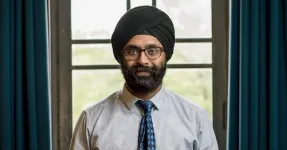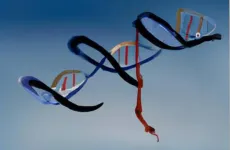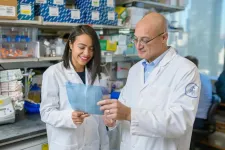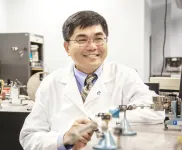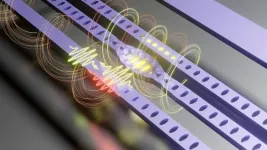(Press-News.org) Karandeep Singh, MD, has been recruited as the Joan and Irwin Jacobs Endowed Chair in Digital Health Innovation at University of California School of Medicine and named as the inaugural chief health artificial intelligence (AI) officer at UC San Diego Health, a newly developed position for the region’s only academic medical center.
This new role will be effective December 29, 2023.
In this position, Singh will focus on implementing change that advances safety and health outcomes in acute and ambulatory settings. His contributions will be pivotal in bringing innovation to the bedside, connecting the science and discovery that arise from academic and industry partners.
He will lead organizational approaches that integrate AI into clinical workflows, reduce documentation time, improve efficiencies and patient experience, while ensuring the appropriate structure and governance are in place for successful, accountable AI deployment in health care.
“Having worked with Dr. Singh previously in our careers, I have witnessed his impressive track record and deep expertise in health care technology firsthand,” said John M. Carethers, MD, vice chancellor for Health Sciences at UC San Diego. “He has become a national leader in the evaluation of proprietary AI technologies, a specialist in AI governance and has actively engaged in influencing AI policy with considerable experience and impact.”
Appointing the first chief health AI officer for UC San Diego Health enhances the Joan and Irwin Jacobs Center for Health Innovation’s (JCHI) vision to develop sophisticated and advanced solutions in health care.
“Dr. Singh’s expertise and reputation for being nationally recognized in the application of AI and digital health in the clinical setting will have a strong impact in the direction of JCHI and beyond,” said Christopher Longhurst, MD, executive director of the Jacobs Center for Health Innovation, and chief medical officer and chief digital officer at UC San Diego Health. “He is a dedicated trailblazer, who is uniquely qualified for this new role that will meaningfully bridge the gap between human expertise and technological advancements to improve lives.”
Founded in September 2021, JCHI was launched as a model of the University Health Network’s (UHN) Techna Institute to integrate best practices for patient and health care research. Their mission is to use AI to enhance human health and sustainability in ways that are responsible, inclusive and to empower the individuals it serves.
In early 2023, philanthropists Joan and Irwin Jacobs’ generous $22 million gift to JCHI propelled the reality of the mission control center, an AI-fueled hyper-connected hub that will use leading-edge analysis to provide the highest quality of care.
“I’m thrilled to take on this new role and help build out an AI strategy that will improve the experiences of the people receiving and delivering care within our health system,” said Singh.
Singh shared that his focus will also include driving innovation beyond the hospital walls and expanding the health system’s reach to entire communities, industries and stretching as far as the national level.
“My goal is for UC San Diego Health to have greater representation on the national stage where AI policies are being actively shaped, and to ensure that groundbreaking research happening in AI has a path towards being implemented and evaluated with the goal of improving people’s lives and experiences.”
As a nephrologist, Singh also holds a master’s degree in biomedical informatics from Harvard Medical School. He achieved his medical education at the University of Michigan Medical School and completed his internal medicine residency at UCLA Medical Center.
Singh brings the same pioneering drive from preceding positions as associate professor of learning health sciences, internal medicine, urology, and information at the University of Michigan. He also proudly served as the associate chief medical information officer of artificial intelligence at Michigan Medicine.
In 2022, Singh participated in the first invite-only Google Health Bioethics Summit, an exclusive conference of national experts encouraged to assist Google Health develop policies and principles related to AI use in health care. He used this opportunity to advocate for transparency in Google’s approach.
His research has been cited in several policy documents, including the White House’s Blueprint for an Artificial Intelligence Bill of Rights, U.S. Department of Health and Human Services, U.S. Government Accountability Office, National Academy of Medicine, the UK Government Regulatory Horizons Council, New Zealand Ministry of Health, and in New York City’s Artificial Intelligence Strategy.
Additionally, he has published several high-impact evaluations highlighting key issues in the use of proprietary AI models.
“Dr. Singh’s leadership in technology will help us move health care forward by navigating a rapidly evolving digital era that will drive UC San Diego Health to the forefront of responsible AI development and implementation,” said Amy Sitapati, MD, chief medical information officer for population health and interim chair of the Department of Biomedical Informatics at University of California School of Medicine.
“Among Dr. Singh’s prestigious achievements and foundational knowledge in biomedical informatics, I’m confident that he will harness relationships with key leaders to drive AI initiatives and shape the potential transformation of AI in health care.”
Singh’s commitment to discovering new ways for technology to positively serve the public aligns with UC San Diego Health’s mission to deliver outstanding patient care through commitment to the community, groundbreaking research and inspired teaching. The role supports UC San Diego Health’s efforts to champion AI and lead the way in integrating the power of leading-edge technology in health care with the research lab embedded within the health system.
AI is already being utilized in the emergency departments at UC San Diego Health to analyze clinical and electronic health record data to predict which patients are most at risk for developing sepsis, resulting in more lives saved.
Additionally, the health system launched a pilot in which Epic, a cloud-based electronic health record system, and Microsoft’s generative AI integration automatically drafts more compassionate message responses through ChatGPT, alleviating this additional step from doctors and caregivers so they can focus on patient care.
“I’m eager to work with UC San Diego Health’s leadership to expand our shared goals of making care better, faster, and more accessible,” said Singh. “UC San Diego Health’s commitment to excellence in clinical care, research, and innovation gives us the opportunity to dream big and rethink how health care should be delivered in the AI era.”
By adding this position, UC San Diego Health joins UCSF Health and UC Davis Health, which incorporated the chief health AI officer role in their health systems in 2023.
# # #
END
Karandeep Singh, MD, named inaugural Chief Health AI Officer at UC San Diego Health
Singh will lead the initiatives that will bring technological advancements that bridge science and discovery to improved clinical care, workflows and outcomes
2023-12-12
ELSE PRESS RELEASES FROM THIS DATE:
Genetic safeguard protects some considered high risk for kidney disease
2023-12-12
NEW YORK, NY--Many Black Americans who are thought to have a high risk of developing kidney disease possess a protective genetic variant that nullifies the extra risk, a new study from Columbia researchers has found.
The study found that high-risk people who carry this variant have a risk of developing kidney disease much closer to that of the general population.
The findings will have an immediate impact on clinical practice, says study leader Simone Sanna-Cherchi, MD, associate professor of medicine at Columbia’s Vagelos College of Physicians and Surgeons.
“Physicians ...
Liquid biopsy predicts immunotherapy response and toxicity in patients with advanced lung cancer
2023-12-12
FOR IMMEDIATE RELEASE
Using a “liquid biopsy” to study genetic material from tumors shed into the bloodstream together with immune cells could help clinicians predict which patients with advanced lung cancers are responding to immunotherapies and which patients may develop immune-related side effects several months later, according to research directed by investigators at the Johns Hopkins Kimmel Cancer Center, the Bloomberg~Kimmel Institute for Cancer Immunotherapy and Allegheny Health Network Cancer Institute in Pittsburgh.
By monitoring changes in circulating tumor DNA (ctDNA) among 30 patients treated with immunotherapies for metastatic non-small cell lung cancers, ...
Heavy metals in our food are most dangerous for kids
2023-12-12
WASHINGTON, DC, 2023, December 12, 2023 – The problem of foodborne metal contamination has taken on new urgency, thanks in part to a 2021 US Congressional Report detailing high levels of metals found in infant food pulled off grocery shelves. (More recently, high levels of lead were discovered in children’s fruit puree pouches.) Now, two new studies provide information on the correlation between exposure to heavy metals in food and the risk of cancers and other serious health risks. The findings will be presented ...
Artificial intelligence systems excel at imitation, but not innovation
2023-12-12
Artificial intelligence (AI) systems are often depicted as sentient agents poised to overshadow the human mind. But AI lacks the crucial human ability of innovation, researchers at the University of California, Berkeley have found.
While children and adults alike can solve problems by finding novel uses for everyday objects, AI systems often lack the ability to view tools in a new way, according to findings published according to findings published in Perspectives on Psychological Science, a journal of ...
MSK’s Omar Abdel-Wahab honored for research targeting blood cancers
2023-12-12
Physician-scientist Omar Abdel-Wahab, MD, is being honored at the 2023 American Society of Hematology (ASH) Annual Meeting with the William Dameshek Prize, which recognizes individuals who have made outstanding contributions to the field of hematology. The award will be presented December 12.
Dr. Abdel-Wahab, who chairs the Molecular Pharmacology Program at Memorial Sloan Kettering Cancer Center (MSK), was selected for his “trailblazing research” characterizing the genetic mutations that drive blood ...
Black individuals more likely to experience inequities in early diagnosis and treatment of Lyme disease, new research shows
2023-12-12
A new study out of the Johns Hopkins Medicine Lyme Disease Research Center has revealed disparities in the diagnosis and treatment of Lyme disease between Black and White patients with the condition. Researchers say the data, which draws on participants’ medical histories, whether from Johns Hopkins Medicine or other institutions, highlights issues in the nation’s medical education on Lyme disease.
In the full article, published December 12 in JAMA Network Open, researchers say that Black patients were more likely to have advanced stages of Lyme disease when clinically diagnosed and also experience a longer time before receiving antibiotic treatment for the condition.
Lyme ...
National Academy of Inventors honors SMU professor J.-C. Chiao as fellow
2023-12-12
DALLAS (SMU) J.-C. Chiao, the Mary and Richard Templeton Centennial Chair and professor in the Electrical and Computer Engineering Department in the SMU Lyle School of Engineering, has been named a fellow of the National Academy of Inventors (NAI).
Election as an NAI fellow is the highest professional distinction awarded to academic inventors. The NAI Fellows Program highlights academic inventors who have demonstrated a spirit of innovation in creating or facilitating outstanding inventions that have made a tangible impact on quality of life, economic development and the welfare of society.
Chiao, one of 162 inventors selected for the ...
Study paves way for development of advanced quantum networks
2023-12-12
The ability to transmit information coherently in the band of the electromagnetic spectrum from microwave to infrared is vitally important to the development of the advanced quantum networks used in computing and communications.
A study conducted by researchers at the State University of Campinas (UNICAMP) in Brazil, in collaboration with colleagues at ETH Zurich in Switzerland and TU Delft in the Netherlands, focused on the use of nanometric optomechanical cavities for this purpose. These nanoscale resonators promote interaction between high-frequency ...
Sanford Burnham Prebys elects Lori Moore to its Board of Trustees
2023-12-12
Sanford Burnham Prebys today announced that Lori Moore will join the Institute’s Board of Trustees.
“With many years in health care, both as a provider and a leader, Lori brings a welcomed depth and breadth of experience,” says David A. Brenner, president and CEO of Sanford Burnham Prebys. “Her perspectives will be much valued as the Institute advances its message of translating science into health.”
Moore is a registered nurse, a fifth-generation San Diegan and a member of the Cushman family, whose philanthropic endeavors span decades. She serves as vice president of The Cushman Foundation, which supports a wide range of community ...
New study explores ways to reduce inflammation and preserve bone health with prunes
2023-12-12
A new study published in The Journal of Nutrition shows daily consumption of prunes may reduce inflammation markers connected to bone signaling pathways and reduce the effects of bone loss among postmenopausal women.
“Bone loss is a significant issue impacting more than 50% of women over the age of 50, and there is no cure,” said Principal Investigator Mary Jane De Souza, PhD, Professor, Department of Kinesiology, Pennsylvania State University. “While medications and hormone therapies are available, they often require lifelong management and come with risks. It’s ...
LAST 30 PRESS RELEASES:
Scientists identify smooth regional trends in fruit fly survival strategies
Antipathy toward snakes? Your parents likely talked you into that at an early age
Sylvester Cancer Tip Sheet for Feb. 2026
Online exposure to medical misinformation concentrated among older adults
Telehealth improves access to genetic services for adult survivors of childhood cancers
Outdated mortality benchmarks risk missing early signs of famine and delay recognizing mass starvation
Newly discovered bacterium converts carbon dioxide into chemicals using electricity
Flipping and reversing mini-proteins could improve disease treatment
Scientists reveal major hidden source of atmospheric nitrogen pollution in fragile lake basin
Biochar emerges as a powerful tool for soil carbon neutrality and climate mitigation
Tiny cell messengers show big promise for safer protein and gene delivery
AMS releases statement regarding the decision to rescind EPA’s 2009 Endangerment Finding
Parents’ alcohol and drug use influences their children’s consumption, research shows
Modular assembly of chiral nitrogen-bridged rings achieved by palladium-catalyzed diastereoselective and enantioselective cascade cyclization reactions
Promoting civic engagement
AMS Science Preview: Hurricane slowdown, school snow days
Deforestation in the Amazon raises the surface temperature by 3 °C during the dry season
Model more accurately maps the impact of frost on corn crops
How did humans develop sharp vision? Lab-grown retinas show likely answer
Sour grapes? Taste, experience of sour foods depends on individual consumer
At AAAS, professor Krystal Tsosie argues the future of science must be Indigenous-led
From the lab to the living room: Decoding Parkinson’s patients movements in the real world
Research advances in porous materials, as highlighted in the 2025 Nobel Prize in Chemistry
Sally C. Morton, executive vice president of ASU Knowledge Enterprise, presents a bold and practical framework for moving research from discovery to real-world impact
Biochemical parameters in patients with diabetic nephropathy versus individuals with diabetes alone, non-diabetic nephropathy, and healthy controls
Muscular strength and mortality in women ages 63 to 99
Adolescent and young adult requests for medication abortion through online telemedicine
Researchers want a better whiff of plant-based proteins
Pioneering a new generation of lithium battery cathode materials
A Pitt-Johnstown professor found syntax in the warbling duets of wild parrots
[Press-News.org] Karandeep Singh, MD, named inaugural Chief Health AI Officer at UC San Diego HealthSingh will lead the initiatives that will bring technological advancements that bridge science and discovery to improved clinical care, workflows and outcomes
